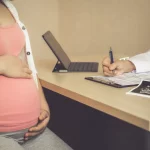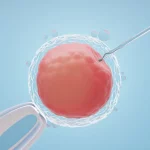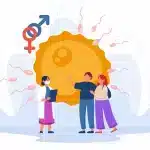
Fertility is a complex and ever-changing process that is dependent on many different aspects, and aging plays a vital role in evaluating the capacity of a woman to become pregnant. As women get older, they see a decrease in the quantity and quality of eggs they make, naturally diminishing, making it more difficult to get pregnant.
For some women, this decline could trigger the need to consider assisted reproduction technology (ART) like, for instance, egg donation. In this downward information, we will explore the impact of age on fertility and discuss whether egg donation could be the right option for you, with insights on services like EggDonors4All, a leading egg donation agency. It is also crucial to take into consideration factors such as egg donor compensation in looking into egg donation options since it is a crucial factor in the entire process.
Understanding the Decline of Fertility with Age
A woman’s fertility peaks in her 20s, and it is during this time that the chances of conception are highest. However, as women approach their 30s, fertility begins to decline gradually. This decline becomes more significant around the mid-30s, and by the time women reach 40, natural conception becomes increasingly difficult.
The reduction in fertility with age can be attributed to both a decrease in the number of eggs and a decline in their quality. Women are born with a finite number of eggs, and as they age, the eggs naturally deplete over time. Older eggs are also more likely to possess genetic defects that raise the chance of miscarriage and genetic disorders such as Down syndrome.
As a result, a woman’s fertility potential diminishes with age, even though she may continue to have regular menstrual cycles and ovulate. If you’re thinking about donating eggs it is important to consider aspects like egg donor compensation within the donation process.
The Role of Egg Donation in Overcoming Age-Related Fertility Challenges
One type of assisted reproductive technology is egg donation, which can help women overcome age-related fertility issues. It involves receiving eggs from a donor, which are then fertilized with sperm and implanted into the recipient’s uterus through in vitro fertilization (IVF). Many women turn to the best egg donor agency to find high-quality donor eggs for their fertility treatments.
Donor eggs are usually sourced from healthy women who are in their 20s or 30s because eggs that are from young women tend to have a better chance of success in IVF. Utilizing donor eggs dramatically increases the chances of having a successful embryo, particularly for women who are in their 40s and those who have fewer ovarian reserves.
Additionally, the donor eggs are typically checked for genetic conditions. That means, there is less chance of passing on genetic disorders. This is what makes egg donation in New York an attractive option for those facing problems with fertility due to age or other reasons.
Key Considerations When Deciding on Egg Donation
Before you decide to make an egg donation, you need to think about a variety of factors to determine if it’s the best choice for you:
The age-related & fertility diagnostic
When you’re 30s or 40s and you’re struggling to get pregnant, then undergoing fertility tests is an essential first step. First step, a fertility specialist can assess your ovarian reserve and help determine whether IVF with your own eggs might still be an option. If the testing reveals that your eggs are no longer viable, egg donation might be recommended.
Health and Screening of Donor Eggs
One of the advantages of using donor eggs is that they typically come from healthy, fertile women. However, it’s essential to ensure that the donor has undergone thorough screening for genetic conditions, infectious diseases, and other health factors. A reputable egg donation agency, such as EggDonors4All, ensures that donors meet strict physical and mental health criteria, providing high-quality donor eggs for prospective parents.
Emotional Considerations
Egg donation may trigger feelings, specifically when it comes to genetic connections and parental responsibility. Certain women might find having a child without a genetic link difficult. It’s important to talk about the feelings you are experiencing with your partner and then determine whether egg donation is in line with your emotional and mental readiness to have children.
Financial Considerations
Egg donation can be costly. Expenses for selecting a donor, compensation for the donor, IVF procedures, and additional medical care can add up quickly. If you’re considering egg donation in New York, be sure to research financial aid options, insurance coverage, and possible payment plans.
Legal and Ethical Issues
Egg donation requires a legal agreement outlining the duties and privileges of both donors as well as the recipient. The legal framework regarding egg donation may differ according to the state or country where you reside. Knowing the ethical and legal requirements is vital.
Success Rates
Using donor eggs generally results in higher IVF success rates than using a woman’s own eggs, particularly for women over the age of 35. The use of young, healthy eggs dramatically increases the odds of a successful embryo. However, like any fertility treatment, it isn’t guaranteed, and the odds of success may differ according to the specific circumstances and methods.
Alternative Options to Egg Donation
For women who are experiencing problems with fertility that are a result of age, egg donation isn’t the only choice. It is crucial to understand the requirements for egg donation because these guidelines can guarantee the success of your donation. Women can choose to investigate alternative options, like:
- Embryo donation: Like egg donation, the process of donating an embryo is the process of receiving a fertilized embryo from an individual donor. This option may appeal to those who are unable to use their eggs but still want to avoid the genetic and emotional complexities of egg donation.
- Adoption: Adoption is another path to parenthood for people who can’t get pregnant with their own eggs. While adoption involves its own set of challenges, it offers a way to become parents without needing to rely on biological reproduction.
- Egg Freezing: For women who wish to maintain their fertility but are not yet ready to establish a family for the future, egg freezing may be a viable option. By freezing eggs at a younger age, women can use these eggs later in life when they are ready to conceive, even if their natural fertility has declined.
Frequently Asked Questions:-
Q: What is egg donation?
Ans: Egg donation is a process where a woman receives eggs from a donor, which are then fertilized and implanted through IVF to help with conception.
Q: How does age affect fertility?
Ans: As a woman ages, both the number and quality of her eggs decline, making conception more difficult, particularly beyond age 35.
Q: What are the benefits of using donor eggs?
Ans: IVF success rates are higher when donor eggs come from younger women. They are typically screened for genetic disorders, reducing the risk of complications.
Q: What are the emotional considerations of egg donation?
Ans: Some women may feel emotional challenges about raising a child without a genetic connection. It’s important to discuss these feelings before deciding.
Q: Are there alternatives to egg donation?
Ans: Yes, alternatives include embryo donation, adoption, and egg freezing, depending on the individual’s needs and circumstances.
Conclusion
Age is a key factor in a woman’s capacity to conceive. Fertility generally decreases as women get older, especially at the age of 35. For women who are struggling with fertility due to aging, donating eggs can be a great option to improve egg quality and quantity. With the help of eggs donated by healthy, young donors, many women have experienced childbirth and the birth of a baby. However, the donation of eggs is a crucial choice that requires emotional, financial, and legal aspects.
Services like EggDonors4All offer extensive donor egg programs and can provide valuable support as you explore this path to parenthood. Whether you are looking into the egg donation process, learning about being an egg donor, or exploring donor eggs New York, ensuring that you choose the best egg donor agency will be key to a successful journey.
By understanding the egg donation process and researching requirements for egg donation, prospective parents can make well-informed choices about their fertility journey. Whether you are interested in become an egg donor or seeking donor eggs in New York, finding a reputable egg donation agency will help ensure a successful experience.

Dr. Veera Saghar
As an Egg Donor Coordinator, she plays a critical role in our company. Her background as a medical graduate from ISRA UNIVERSITY in Pakistan provides us with a solid foundation in the medical sciences. She has seven years of clinical experience practicing in the USA. This has given her firsthand experience when collaborating with patients and their families.
She is responsible for managing the process of egg donation from start to finish. We identify and screen potential egg donors.







